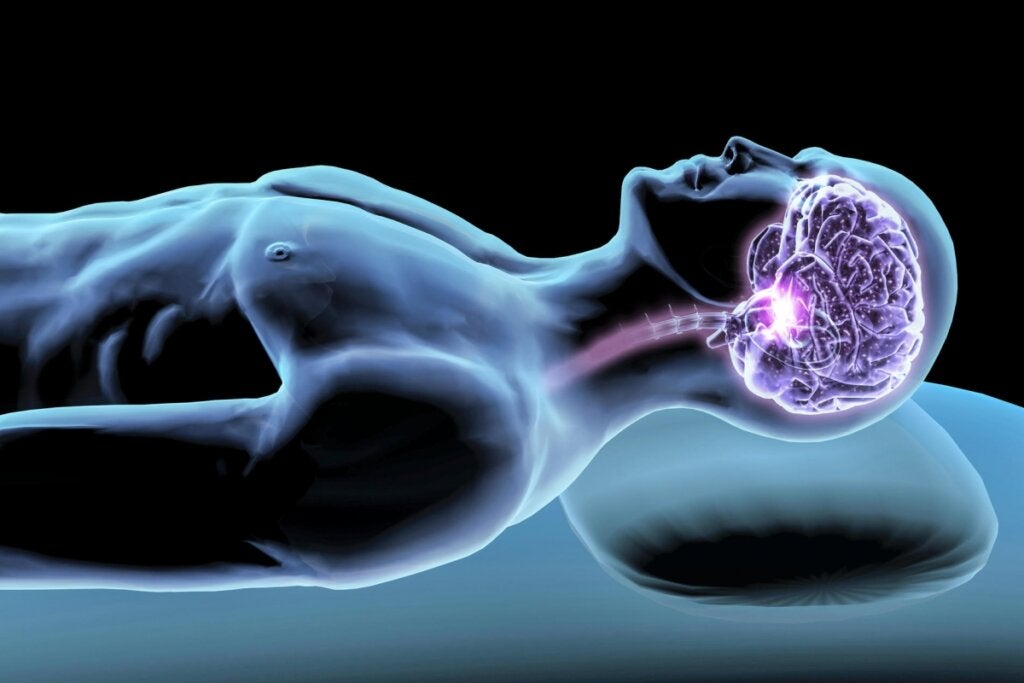Some people experience sudden loud noises or explosive crashing sounds in their head just before they fall asleep or when they awake from a deep sleep. These unexpected sounds aren’t real. In fact, they’re due to a sleep disorder known as exploding head syndrome or episodic cranial sensory shock. It causes the sufferer to perceive a strong internal sound while they’re in a dream state.
It sounds so bizarre and even terrifying it’s like something from a David Lynch film. What’s more, sufferers describe these sounds as extremely powerful and overwhelming. However, although it’s true that this phenomenon is somewhat curious within the world of parasomnias, it’s a more recurrent alteration than you may think.
As a matter of fact, there are studies that indicate that about 40 percent of people have experienced this rare sleep disorder at some time in their life. Five percent of that percentage claim they suffer from it between once and twice a week. Why is this? What’s the origin? Can it be treated in any way? We take a look.
Exploding head syndrome doesn’t pose any health risk. Nor is it due to any neurological disease. Nonetheless, it usually causes great anxiety and fear to those who suffer from it.
Exploding head syndrome: characteristics, causes, and treatment
One of the latest studies on exploding head syndrome was conducted by King Saud University (Saudi Arabia). Researchers defined it as an underrecognized type of parasomnia that causes a sudden loud noise when an individual has just fallen asleep or is about to wake up. The sound is similar to an auditory hallucination.
The researchers concluded that it’s a benign condition and it can be effectively treated with amitriptyline (a type of antidepressants).
It’s also worth mentioning another study conducted at an international level in collaboration with several prestigious universities. In fact, it was the BBC Science Focus magazine that proposed this research in order to understand the phenomenon in depth.
How does it manifest?
An episode of exploding head syndrome lasts less than a second. The person experiences a sound similar to an intense rumble, akin to an internal and mental explosion. There’s no doubt, at any time, that it’s a psychological phenomenon and that the explosion doesn’t come from an external or environmental source.
- The experience doesn’t involve any type of pain.
- Occasionally, flashes of light and a body-tingling sensation may occur.
- The sensation that the head is ‘exploding’ is accompanied by a state of anxiety and nervousness. In fact, it’s common to also experience tachycardia and a feeling of suffocation.
- The disorder appears most often when the individual tries to fall asleep. However, the moment they succeed, they wake up to the sound of an explosion. It’s rather similar to when we wake up because we’re dreaming that we’re falling.
- Exploding head syndrome is more common in women.
This type of phenomenon is usually experienced as something dramatic and terrifying. Although, in reality, it’s a harmless parasomnia without any neurological origin, those who suffer from it may experience serious problems in falling asleep for fear of experiencing the syndrome again.
The cause of exploding head syndrome
This syndrome was described for the first time in 1870. Currently, there’s no conclusive data on the origin and cause that determines it. Nevertheless, although its exact etiology is unknown, there are two factors that correlate significantly: stress and fatigue.
Patients experiencing exploding head syndrome generally report having previously felt intense fear and anxiety while they were asleep. Therefore, there’s a possibility that a mental state of permanent anguish and stress sustained over time could be behind the disorder.
The condition could also be due to an organic alteration. For example, a sudden movement in some part of the middle ear or the Eustachian tube. A relationship with migraine has also been noted. Nevertheless, more studies are necessary in order to reliably identify the variables behind this harmless yet disturbing experience suffered by a small part of the population.
It’s important to emphasize that exploding head syndrome is a real phenomenon and isn’t caused by psychopathological or neurological alterations. We must try and understand those who suffer from it.

How is it treated?
As we mentioned earlier, it’s been shown that treatment with antidepressants completely reduces the appearance of this type of parasomnia. Nevertheless , before resorting to psychotropic drugs, we should point out that clear improvements have also been seen by providing sufferers with stress management and relaxation techniques.
The main problem of exploding head syndrome is that it increases poor night rest. A lack of restful sleep raises stress and, with it, the obvious risk of suffering the upsetting experience again. The key is, in all cases, to introduce skills to manage stress and improve sleep hygiene.
Finally, it’s undeniable that the world of parasomnias is as extensive as it’s complex. Therefore, if you should experience any alteration or unusual occurrences in your nightly rest routine, don’t hesitate to consult with a specialist.
The post Exploding Head Syndrome: A Curious Sleep Disorder appeared first on Exploring your mind.



















Comments